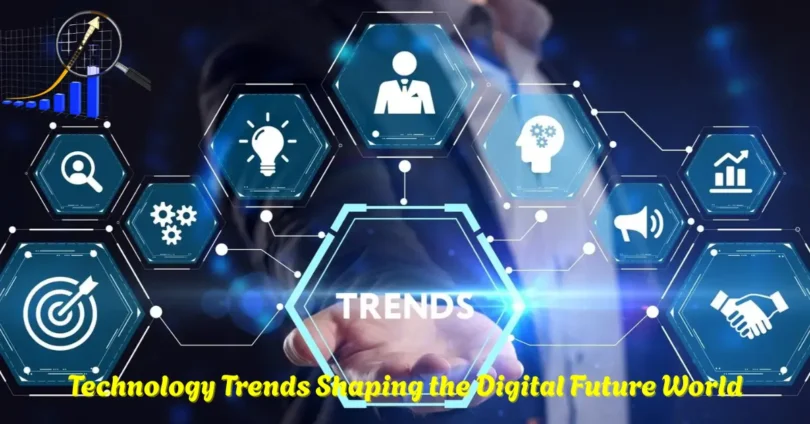Technology Trends Shaping the Digital Future World, The digital world is changing faster than ever, driven by advanced technologies that shape our daily lives. From artificial intelligence to connected devices, these trends are transforming the way we live, work, and interact. Staying updated with technology trends is key for businesses, students, and individuals to thrive in a fast-evolving digital era.
Artificial Intelligence and Machine Learning
Artificial Intelligence (AI) and Machine Learning (ML) are at the heart of modern technology. AI allows machines to think and make decisions, while ML enables systems to learn from data without being explicitly programmed.
- Applications in Daily Life: Voice assistants like Siri and Alexa, recommendation systems on Netflix and Amazon, and smart home devices.
- Business Impact: Predicting customer behavior, automating tasks, improving services, and increasing efficiency.
- Healthcare Benefits: AI helps doctors diagnose diseases accurately, while ML finds patterns in medical data that humans may miss.
- Finance Sector: Detects fraud, manages risks, and automates trading.
AI and ML are continuously evolving, offering new opportunities for innovation and transforming industries worldwide.
Internet of Things (IoT) and Connected Devices
The Internet of Things (IoT) connects devices to share data and perform tasks automatically. IoT is shaping smart homes, cities, and industries.
- Smart Homes: Automated lighting, security cameras, and thermostats improve comfort and efficiency.
- Wearables: Smartwatches and fitness trackers monitor health and activity in real-time.
- Connected Vehicles: IoT-enabled cars provide navigation, safety alerts, and remote control features.
- Industrial IoT: Sensors and connected machines boost factory efficiency and reduce downtime.
- Healthcare: Remote patient monitoring improves care and reduces hospital visits.
- Future Possibilities: Smarter cities, energy-efficient systems, and fully connected ecosystems.
IoT enhances convenience, efficiency, and real-time decision-making in daily life and industries.
5G and Advanced Connectivity
5G is the next-generation wireless technology that offers faster speeds and low latency. It supports seamless connectivity for devices and applications.
- Impact on Daily Life: Smooth streaming, online gaming, and instant downloads.
- Business Applications: Improved remote work, cloud services, and real-time collaboration.
- IoT Enablement: 5G allows more devices to connect simultaneously without lag.
- Healthcare and Smart Cities: Remote surgeries, traffic management, and smart energy solutions benefit from faster connectivity.
5G is essential for the digital future, enabling new applications and smarter technologies.
Cloud Computing and Edge Computing
Cloud computing allows storing and accessing data online, while edge computing processes data closer to the source.
- Business Benefits: Faster operations, reduced costs, and scalable solutions.
- Real-Time Analytics: Edge computing helps analyze data immediately for quick decision-making.
- Applications: Online storage, software as a service (SaaS), and real-time IoT analytics.
Together, cloud and edge computing provide flexible and efficient solutions for businesses and individuals.
Blockchain and Digital Security
Blockchain technology ensures secure and transparent digital transactions. It is widely used in finance, supply chain, and healthcare.
- Data Protection: Prevents hacking and fraud.
- Cryptocurrency: Blockchain enables secure and decentralized currency transactions.
- Trust and Transparency: Improves credibility in digital systems.
Blockchain is shaping a secure digital future where trust and reliability are key.
Augmented Reality (AR) and Virtual Reality (VR)
AR and VR are creating immersive digital experiences in gaming, education, and healthcare.
- Applications: Virtual classrooms, interactive training, gaming, and real estate virtual tours.
- Impact: Enhances user engagement and learning experiences.
- Future Scope: AR glasses, VR simulations, and mixed reality applications.
AR and VR are expanding possibilities for both entertainment and professional industries.
Robotics and Automation
Robotics and automation improve efficiency and precision in various industries.
- Industrial Use: Robots in manufacturing reduce errors and increase production.
- Healthcare: Surgical robots assist doctors in complex procedures.
- Daily Life: Automated home devices like vacuum cleaners and lawn mowers.
Automation reduces manual effort and enhances productivity across sectors.
Cybersecurity Trends
As technology grows, cybersecurity becomes crucial. Protecting digital assets is essential for businesses and individuals.
- Current Trends: AI-based threat detection, multi-factor authentication, and strong encryption.
- Importance: Prevents data breaches and protects sensitive information.
- Tips: Regular updates, secure passwords, and cautious online behavior.
Strong cybersecurity measures ensure safe digital experiences and trust.
Big Data and Analytics
Big Data helps businesses analyze large volumes of information to make informed decisions.
- Applications: Personalized marketing, predictive analytics, and operational optimization.
- Benefits: Real-time insights, improved customer experiences, and better strategies.
- Future Trends: AI-powered analytics and automated decision-making.
Big Data is the foundation for smarter, data-driven digital solutions.
Green Technology and Sustainable Tech
Technology is also moving towards sustainability to reduce environmental impact.
- Examples: Renewable energy, energy-efficient devices, and eco-friendly manufacturing.
- Benefits: Reduces carbon footprint, lowers energy costs, and promotes green innovation.
- Future Scope: Smart energy grids, electric vehicles, and sustainable digital infrastructure.
Green technology ensures that the digital future is eco-friendly and responsible.
Quantum Computing
Quantum computing promises to solve complex problems faster than traditional computers.
- Applications: Drug discovery, cryptography, financial modeling, and AI research.
- Impact: Accelerates innovation and solves challenges that classical computers cannot.
- Future Potential: Transform industries and scientific research with unmatched computing power.
Quantum computing represents the next leap in technology for the digital era.
Challenges and Ethical Considerations
While technology offers many benefits, challenges must be addressed responsibly.
- Data Privacy: Protecting personal and business data is critical.
- AI Ethics: Avoiding bias and ensuring transparency in AI decisions.
- Digital Divide: Ensuring access to technology for all communities.
Balancing innovation with ethics ensures a sustainable and fair digital future.
Future Outlook
The combination of AI, IoT, 5G, cloud computing, and other trends is shaping a connected, intelligent, and efficient world. Businesses, students, and individuals who embrace these trends will have better opportunities to grow and innovate. The digital future is full of possibilities, and staying updated is key to success.
Common FAQs about
1. What are the main technology trends shaping the digital future?
The key trends include Artificial Intelligence (AI), Machine Learning (ML), Internet of Things (IoT), 5G connectivity, Cloud and Edge Computing, Blockchain, AR/VR, Robotics, Cybersecurity, Big Data, Green Technology, and Quantum Computing.
2. How is Artificial Intelligence impacting daily life?
AI is used in voice assistants, recommendation systems, smart home devices, healthcare diagnostics, and finance, making tasks faster and more efficient.
3. What is the role of IoT in modern technology?
IoT connects devices like smart homes, wearable devices, connected cars, and industrial sensors to share data and automate tasks for convenience and efficiency.
4. Why is 5G important for the digital future?
5G provides faster internet, low latency, and the ability to connect more devices simultaneously, supporting advanced applications in healthcare, smart cities, and IoT.
5. What is the future potential of Quantum Computing?
Quantum computing can solve complex problems much faster than traditional computers, impacting AI, medicine, cryptography, and scientific research.
6. How can individuals and businesses stay updated with technology trends?
By following tech news, online courses, webinars, industry reports, and actively experimenting with new technologies.
Conclusion
Technology trends are transforming the digital world at an unprecedented pace. From AI to IoT, 5G, blockchain, and quantum computing, each innovation is creating smarter solutions and new opportunities. Embracing these trends responsibly will help individuals and businesses thrive in a connected, efficient, and sustainable digital future.
Written By: Fullimedia







